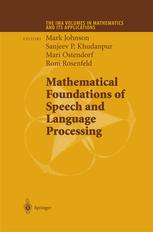

Most ebook files are in PDF format, so you can easily read them using various software such as Foxit Reader or directly on the Google Chrome browser.
Some ebook files are released by publishers in other formats such as .awz, .mobi, .epub, .fb2, etc. You may need to install specific software to read these formats on mobile/PC, such as Calibre.
Please read the tutorial at this link: https://ebookbell.com/faq
We offer FREE conversion to the popular formats you request; however, this may take some time. Therefore, right after payment, please email us, and we will try to provide the service as quickly as possible.
For some exceptional file formats or broken links (if any), please refrain from opening any disputes. Instead, email us first, and we will try to assist within a maximum of 6 hours.
EbookBell Team

0.0
0 reviewsSpeech and language technologies continue to grow in importance as they are used to create natural and efficient interfaces between people and machines, and to automatically transcribe, extract, analyze, and route information from high-volume streams of spoken and written information.
The workshops on Mathematical Foundations of Speech Processing and Natural Language Modeling were held in the Fall of 2000 at the University of Minnesota's NSF-sponsored Institute for Mathematics and Its Applications, as part of a "Mathematics in Multimedia" year-long program. Each workshop brought together researchers in the respective technologies on one hand, and mathematicians and statisticians on the other hand, for an intensive week of cross-fertilization.
There is a long history of benefit from introducing mathematical techniques and ideas to speech and language technologies. Examples include the source-channel paradigm, hidden Markov models, decision trees, exponential models and formal languages theory. It is likely that new mathematical techniques, or novel applications of existing techniques, will once again prove pivotal for moving the field forward.
This volume consists of original contributions presented by participants during the two workshops. Topics include language modeling, prosody, acoustic-phonetic modeling, and statistical methodology.